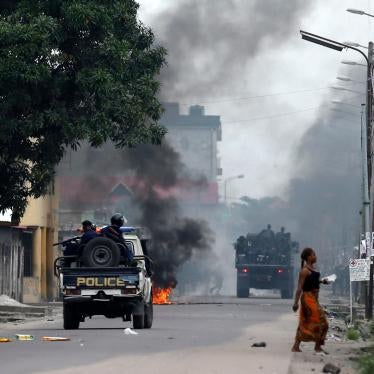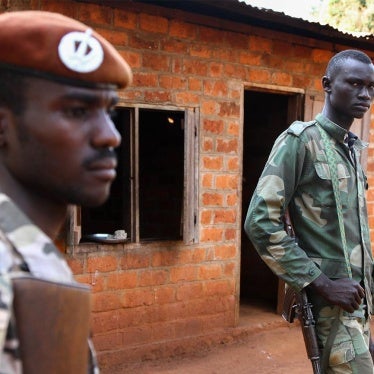(New York) - The United Nations Security Council must enforce the international arms embargo on Liberia, Human Rights Watch said today.
A new U.N. report, prepared by an independent panel of experts and scheduled for discussion at the Security Council today, documents many cases of illegal arms shipments to Liberia in the past eighteen months.
"The arms flows into Liberia make a mockery of U.N. sanctions," said Joost Hiltermann, executive director of the Arms Division of Human Rights Watch. "These weapons fuel brutal wars and feed regional instability-with terrible consequences for human rights."
The Liberia arms embargo was first imposed in 1992 and tightened in March 2001 to curb arms trafficking via Liberia to the Revolutionary United Front (RUF) rebels in Sierra Leone, who are also subject to a U.N. embargo. There has been progress toward disarmament in Sierra Leone, but fighting continues on the border between Guinea and Liberia.
The new U.N. report, which presents detailed information and documentary evidence, reveals that the weapons shipped illegally to Liberia - comprising ammunition, small arms, and helicopter spare parts - came from Ukraine, Slovakia, and Kyrgyzstan, respectively. Two shipments of helicopter gunships, one from Kyrgyzstan via Slovakia and another from Moldova, were halted at the last moment. Planned shipments of massive quantities of small arms from Ukraine were also interrupted. All of the weapons were sold on the basis of counterfeit documents provided by arms brokers. These documents, called end-user certificates, falsely declared the weapons were intended for another country, in most cases Guinea. In at least one case, a regional ally knowingly provided false cover for illegal arms shipments to Liberia.
The arms-trafficking networks of two well-known arms dealers also used fraud to conceal the operations of the front companies and airlines involved in the Liberia shipments.
The pattern echoed what earlier U.N. investigations, as well as research by Human Rights Watch, had uncovered in Angola and Sierra Leone. (See, for example, Human Rights Watch, "Neglected Arms Embargo on Sierra Leonean Rebels," May 2000, and "Angola Unravels," September 1999.)
According to the U.N. report, not one of the exporting countries' governments checked to see if Guinea, the purported end-user, had actually requested the weapons.
"Arms export controls in central and eastern Europe are a disgrace," said Hiltermann. "That makes it easy for arms traffickers to get away with their deadly trade." He urged that arms-exporting governments and multilateral institutions such as the European Union and NATO do more to curb irresponsible arms trading in the region. (See Human Rights Watch, "Letter to E.U. Foreign Ministers on Security Concerns Raised by Arms Transfers from Candidate Countries," October 19, 2001.)
Human Rights Watch called on the Security Council to urgently implement the following key recommendations contained in the Liberia panel's report:
- Immediately ground all aircraft owned, operated, or insured by the companies identified in the U.N. report as having arranged illegal arms flights to Liberia.
- Encourage member states to investigate all arms deals involving any of the companies or individuals named in the report and to communicate their findings to the U.N. sanctions committees.
- Establish a U.N. working group to rapidly develop a standardized end-user certificate that would be difficult to forge.
Human Rights Watch also recommended that the Security Council call on U.N. member states to enact national laws that implement U.N. arms embargoes and to prosecute violators. It further urged the Security Council to authorize UNAMSIL peacekeepers in Sierra Leone to monitor and enforce the arms embargo in force on the RUF there, especially in Kailahun district, and make public the information it collects. Finally, it called on the Security Council to establish a permanent U.N. unit to monitor and report on arms embargo violations.





